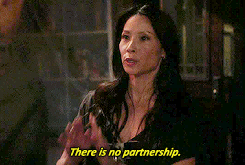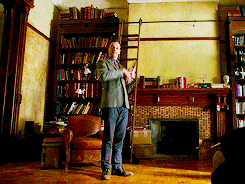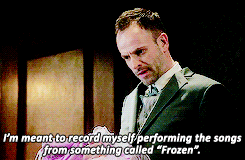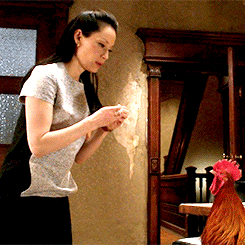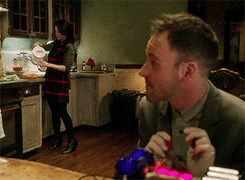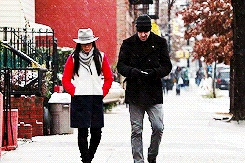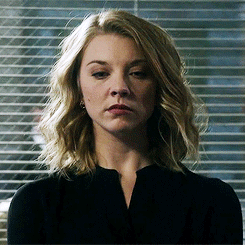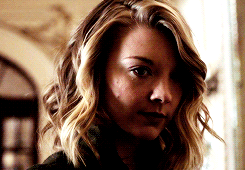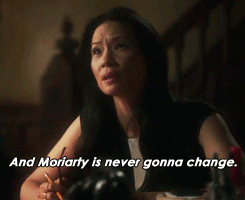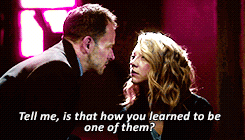**This post contains spoilers for episode 2.18 of Elementary, “The Hound of the Cancer Cells.”**

After a rather mundane night of TV on Thursday night, the clouds parted and the angels sang, because Elementary opened with Joan perched on Bell’s desk as he showed off a gift from his buddies. I feel like it was written just for me, which is absurd because those writers don’t know me, but it’s also great because really good television makes you feel like they know exactly what you want.
Bell is celebrating his return to full duty — gun and all! — and his friends gave him a paint mixer because… why not? Joan’s happy for him too, and he says, “Prove it. A bunch of us are getting together after work Friday, you should come. Your partner, too.” I won’t scream “Date!” but I will point out that Marcus is one of the few people who, when he sees Holmes and Watson, often makes Holmes the afterthought. I wonder if he realizes that.
That’s not why he asked her down here, though. He’s trying to track down a girl named Nicole Watkins, who was a witness to a murder a few months back. This morning, she recanted and asked the D.A.’s office to stop calling her, so Bell wants Joan and Sherlock to track her down and try to talk to her.
Thus begins an episode where Joan and Sherlock are technically on two different cases, in an episode that ends up being more linear than circular as far as storytelling. I say they were “technically” on different cases because Joan assists Sherlock with the A-plot case, which is the titular “Hound of the Cancer Cells” case (a riff of “The Hound of the Baskervilles,” but the case itself has little to do with the one from ACD canon — that leaves me optimistic that the original story might still get interpreted!) involving a man who has appeared to commit suicide over a case of fraud. We actually saw the man, Dr. Granger, hilariously murdered via helium in an unventilated room while he was showering, and someone dragged him out and set him up to make it look like a suicide.
The Hound is a breathalyzer that can detect cancer cells in patients. Dr. Granger was conducting blind studies to prove that The Hound works, but an anonymous tipster claimed that Dr. Granger had falsified the results, so people don’t believe it works anymore. Sherlock decides to dive into uncovering the identity of the tipster, but a lead from Gregson takes them to a travel agency that turns out to be a front for Mossad agents. One of them gives Sherlock information to find Dr. Granger’s killer, because she cared for him. And that’s it. That’s the end of the Mossad thread. Hopefully that gets picked up in a later episode — Shiri Appleby and Jonny Lee Miller were compelling together, and I think it means something that Sherlock knows a Mossad agent now.
Sherlock returns to his search for the anonymous tipster, named Adam Peer (“A Peer,” get it?) and we get to see Joan put her medical experience to good use once again as she recalls a case where pain pill studies were falsified a few years ago. This leads them to Ms. Buckner, who sends them on a wild goose chase after a man who was killed in Mexico in 2012, but Sherlock suspects Ms. Buckner herself had a crisis of conscience back in 2008. She created the Adam Peer persona to be a whistleblower, but Ms. Buckner tells them that she’s only half of Adam Peer — the other half was Dr. Granger. This effectively ends the tipster lead, and Sherlock finds himself back at square one.
After Hank Prince’s estranged wife is found murdered, Sherlock believes Prince is being framed… but ultimately, it was Prince who committed both murders. Twisty! He murdered Dr. Granger to destabilize the studies surrounding The Hound, and when Sherlock floated the theory that Prince was being framed, Prince took advantage of it and murdered his soon-to-be-ex-wife. He wanted to be able to keep all of his money out of his wife’s hands, so that when the divorce was over, he’d be able to keep all of his money. When the first plan went belly-up, Prince decided to just kill his wife and bank on the idea that the police would assume he was framed for that, too.
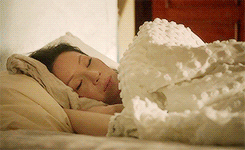
Sherlock’s methods for waking up Joan will never get old.
If you think that case was winding and ended up in an odd place (though not as odd as the ears case from last week) then you’ll find Bell and Watson’s case even more meandering. I mean that in a good way — crime dramas often fall victim to circular storytelling. It can be elegant (“The Woman” / “Heroine” were fantastic in that regard) but in the real world, real cases don’t end with perfect bowties and touching narrative arcs that perfectly relate to the protagonist’s personal life. Castle does this a lot, often through personal drama in Castle’s home life (his daughter has problems with school friends, his mother is having a career issue) that somehow ties perfectly to the case of the week. It’s nice when Elementary episodes go gritty in the sense that sometimes these things don’t add up, that life sometimes sucks and the case they’re working on is senseless and awful, but at the end of the day, they’re still fighting the good fight.
In that same vein, Sherlock grapples with his lingering guilt over Bell’s injury throughout the episode. He’s rather jumpy and twitchy the whole time, and he continuously cuts off Joan whenever she brings up Marcus’s party, to the point that she finally stops and asks him why he keeps doing that. He uses the fact that the party is at a bar as an excuse, but Joan suspects that’s not the only reason.
Sherlock: “You know, there are certain milestones — an officer making detective, a retirement, a wake, an injured man returning to full duty — which belong to the police. It’s their night. It’s their chance to raise a glass, surrounded by their brethren. It’s a fraternity to which, my countless contributions notwithstanding, I will always remain an outsider. And given my role in starting Detective Bell down his detour, it seems inappropriate that I be part of celebrating his return.”
Joan relents at that point, effectively letting Sherlock off the hook, but he reconsiders later, after staring at Joan’s gift — she framed the silhouette that Bell shot in order to re-qualify, it’s a very lovely and thoughtful gift — almost obsessively. Almost like he found something wrong with it. Nevertheless, Bell’s injury arc is finally coming to an end, and it should be a happy occasion, but it turns bittersweet for Marcus. I started out the episode assuming Watson would be primary on the Martens case, but her role ended after she found the witness, Nicole, who is hiding because she just discovered she was pregnant. Joan tries to talk to her, but to no avail, so she defers to Bell and he takes over the case. He goes to visit the teacher that Nicole’s been staying with, a man named Manny Rose. Bell’s actually heard of Rose, he’s legendary in the neighborhood for standing up to the criminal element, so he decides to pay Rose a visit himself.
Rose assures Bell that NIcole will come around and eventually testify, but Bell is actually there to let Nicole off the hook. “The D.A.’s office has their guy, and there’s other evidence. They’ll just have to make the best case they can.” Rose is visibly irritated by this: “Martens killed a boy! A good boy. She can explain to a jury exactly what happened.” Nonetheless, Bell is determined to let Nicole off the hook, and he leaves after getting a call about another case.
The next day, Rose visits Bell at the precinct and tells him that Nicole left to stay with family upstate. Bell reiterates that he’s fine with her decision, but Rose proposes testifying in her place. Bell obviously can’t stand for that, as it’s perjury and he worked so hard to get back on the force. A frustrated Rose says, “Kwami Martens shot that boy in cold blood, right in front of Nicole. Didn’t care that he had a family that loved him. Didn’t care what that would do to Nicole. I have poured my life’s blood into this neighborhood. Never did anything but the right thing.”
Marcus tells a story about how he once stood up to bangers, back when he was twelve years old. He presents himself as an example of a man who could’ve joined a gang, but chose not to, because of men like Rose. “Let me worry about Martens. If we don’t get him this time, we will get him the next. You have my word.”
So Bell isn’t terribly surprised when he gets the call on Friday evening: Rose has been killed in a gang-related shooting. He walked up to Martens and shot him, point-blank. He was killed when Marten’s friends opened fire, and both were declared dead at the scene. Bell stands over him sadly in the morgue, telling the M.E. that he didn’t know Rose personally, “Just the legend.”
He goes to his party, but stands outside on the street, watching his friends start the celebration without him. This is where Sherlock finds him and cracks a few jokes about how he prefers parties that are solitary in nature, but Bell’s in the mood for some honesty.
Bell: “You ever have one of those nights?”
Sherlock: “My fair share.”
Bell: “I worked my ass off to get back. Really back. Harder than I’ve worked at anything my whole life. And everyone in there is expecting me to be happy tonight, but…”
Sherlock: “With the work we do… there’s often a price.”
The look Bell gives him after that is one of the reasons I like him so much. He’s one of the few people who can recognize compassion in Sherlock, where others would see coldness or aloofness. Not Bell. He’s gratified, and what’s more, this is essentially the same speech Sherlock gave Joan last season, when she was disappointed by a date who kept lying to her. He told her that with what they do, there’s always a price, and Joan gave him the same look then that Bell’s giving him now. Disappointment, sadness, and a bit of gratitude.


Bell asks if that’s an invitation, and Sherlock points out that those people will still be there when Bell’s ready. They head off to a coffee shop as the episode fades to black, and my one small complaint is that we didn’t get to see Joan give Bell his gift. I get why they did this, though, and it’s nice to see material still going to Jon Michael Hill even in the periphery of an episode — Bell’s clearly going through an emotional upheaval after the last few months.
Extra:
Sherlock said my favorite quote to date in this episode: “Misanthropy was so easy, Watson. Elegant. I miss it sometimes.”





